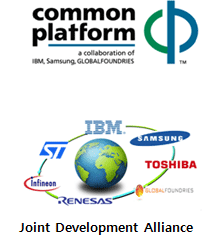Just last
week, I shared about IBM CEO Ginni Rometty’s interview at Fortune’s Most
Powerful Women Summit, where she talked about the corporate strategy of moving
towards higher value and differentiation.
For decades, IBM has been synonymous with innovation, cutting-edge technology, and cool research and developments that pushed the boundaries of what computers were capable of doing. Today, the innovation shifts to create breakthrough R&D innovations that will fuel the next era of computing systems.
In line with
the delivery of that strategy, IBM has announced that it will pay $1.5 billion
to GLOBALFOUNDIRES to take over IBM Microelectronics, its chip-making
factories. According to an anonymous source, IBM will in return receive $200
million worth of assets as part of the supply of chips, making the net deal
value $1.3 billion.
IBM will become
a major customer for GlobalFoundries, buying Power chips from the manufacturing
company for its own mainframe and “scale-out” systems as well as for
next-generation storage systems. IBM will
continue to design high-end chips and sell servers and supercomputers. The deal is
expected close in 2015.
Why GlobalFoundries?
GLOBALFOUNDRIES,
which is owned by the Mubadala Development Co, the Abu Dhabi government's
investment fund, has been collaborating with IBM since their inception in March
2009. GlobalFoundries was created in
2009 when Advanced Micro Devices (AMD) sold its manufacturing operations to
Advanced Technology Investment Co., which is wholly owned by the government of
Abu Dhabi, a part of the United Arab Emirates.
It is the
world’s first full-service semiconductor foundry with a truly global footprint.
Launched in March 2009, the company has quickly achieved scale as the second
largest foundry in the world, providing a unique combination of advanced
technology and manufacturing to more than 160 customers. With operations
in Singapore, Germany and the United States, GLOBALFOUNDRIES is the only
foundry that offers the flexibility and security of manufacturing centers
spanning three continents.
According to Forbes’ contributor Roger Kay, there are only two
foundries and one integrated manufacturer that have the investment capabilities
to undertake risk in the semiconductor industry - Taiwanese TSMC, GlobalFoundries
and Intel. The integrated manufacturer
Intel fights a lonely battle, doing all its R&D internally, building its
own factories, making its own chips, and selling them to customers who build
systems.
In contrast, the industry has Common Platform, an alliance formed with IBM, Samsung, GlobalFoundries who picked up AMD and Singapore’s Chartered Semiconductor and an alliance potentially in British ARM for Qualcomm and Apple. The alliance has great benefits of reduced cost, technology development and physical risk.
This means a serious threat to Intel and a bold reason for IBM to pay GlobalFoundries for IBM Micrelectronics just after divesting their x86 business.
In contrast, the industry has Common Platform, an alliance formed with IBM, Samsung, GlobalFoundries who picked up AMD and Singapore’s Chartered Semiconductor and an alliance potentially in British ARM for Qualcomm and Apple. The alliance has great benefits of reduced cost, technology development and physical risk.
This means a serious threat to Intel and a bold reason for IBM to pay GlobalFoundries for IBM Micrelectronics just after divesting their x86 business.
Check out the news at http://www.youtube.com/watch?v=v71u2pi0DwE






Thanks Anne for sharing the insights of this transaction.
ReplyDeleteSeng Hock Low: Informative articles..Thanks
ReplyDeleteEric Meng Kai Lee: Anne, why does IBM need to pay money to "sell" off the microchip division? Am wondering how this works.
ReplyDeleteThank you Rick for your compliments. It may seem like IBM is divesting, but it is also consolidating with partners to be better able to leverage the economies of scale and lower risks to better compete with other platforms.
ReplyDeleteHi Seng Hock Low, Thank you for your compliments. The technology industry is really changing, much like logistics, there are splits and consolidations.
ReplyDeleteHi Eric Meng Kai Lee, That's a great question!
ReplyDeleteManufacturing micro processors is very expensive. GLOBALFOUNDRIES books est. $10B a year in capital expenditures, just for chip building!
IBM Microelectronics doesn't have sufficient volume to justify manufacturing chips by itself. Last year, the division booked $1.4B revenue but $700M loss. By paying GF $1.5B, they consolidate manufacturing and pool investments & risk. GF will also invest $10B in a year for tech development.
That means IBM gets bargain cheap chips and become more price competitive. The chips will also get better adoption by others, making the IBM chips a more popular platform.
Hope this answers your question!